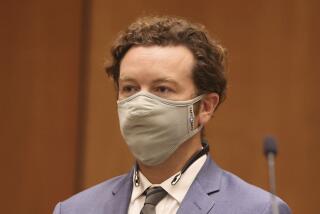Quattrone Judge Wants Deliberations to Resume
- Share via
NEW YORK — The judge in the criminal trial of former Silicon Valley investment banker Frank Quattrone denied a defense request for a mistrial Monday.
Quattrone’s lawyer asked for a mistrial after one of the 11 remaining jurors was unable to attend Monday’s court session because his wife was about to give birth to their first child.
The status of the absent juror is crucial since the jury was reduced from the normal 12 last week when another juror was excused after her mother suffered a heart attack. Three alternates also were excused last week.
If the jury drops to 10 members, the defense can demand that deliberations be halted, increasing pressure on the judge to declare mistrial.
But on Monday, U.S. District Judge Richard Owen rebuffed the defense request and asked jurors to return as early as Wednesday.
“I regret what we’ve hit this morning, but here we are and we don’t have any other options,” Owen said.
The delay threw another wrench into a trial where the jurors’ ability to reach consensus already was in doubt.
On Friday, the panelists told the judge they were in sharp disagreement over whether to acquit or convict Quattrone of obstruction of justice and witness tampering.
“I don’t know that you’re on the verge of a mistrial, but if you were laying odds, they’d be that there’s not going to be a conviction in this case,” said Stephen Ryan, a former prosecutor who is now a partner at Manatt Phelps & Phillips in Washington.
Quattrone is accused of trying to impede two government investigations of certain practices at his former investment bank in 2000 by sending an e-mail that encouraged employees at the firm, Credit Suisse First Boston, to destroy documents.
According to a court transcript of a closed-door meeting Monday between the lawyers and the judge, John Keker, Quattrone’s counsel, implored Owen to declare a mistrial, arguing that the gap between the end of closing arguments and the probable resumption of deliberations was too long.
Given the high-profile nature of the case, the lawyer said, heavy media coverage could taint jurors and lead to “a seriously unfair result.”
Keker also argued that jurors were anxious to finish the trial, saying they were “visibly blanching and [showing] looks of horror” at having to continue.
Steven Peikin, the lead prosecutor, disputed that notion, noting that the deliberations only began late Wednesday.
“They’ve only been at this, by my count, about 10 to 12 hours, which, in a case like this, does not seem to be an extraordinary amount of deliberations,” Peikin said, according to the transcript .
Though he refused to grant a mistrial, Owen said Keker could renew his request depending on how events play out this week.
Legal experts said the delay thus far was insufficient grounds for a mistrial.
During the trial, Quattrone underwent a grueling cross-examination in which he had to admit that he took part in the distribution of coveted new-stock offerings at CSFB.
His defense team had portrayed his role as hands-off.
That is a key issue in the case. Quattrone had claimed that he had no incentive to hinder the government’s probes, which were focused on initial public offering allocations, since he had said his banking team did not decide which investors would receive shares of hot IPOs.
Outside experts have second-guessed Keker for not broaching the idea of Quattrone’s involvement in stock allocations in his direct questioning of the banker.
If a mistrial were declared, prosecutors would have to decide whether to try Quattrone again. Peikin told Owen on Monday that the government probably would do so, according to the meeting transcript.
Prosecutors sometimes can gain ground in second trials because they already have had a first look at the defense’s strategy. But in this case, a mistrial probably would be a bigger boost to Quattrone because the defense could retool its presentation regarding IPO allocations, many experts say.
“A mistrial is a victory for the defense,” Ryan said.
On Wednesday, Owen is expected to give the jury the so-called Allen charge, which is basically an instruction to try harder to reach a unanimous decision.
Legal experts generally regard the Allen charge as a move that helps the prosecution.
Owen has ruled in favor of the government in most of his decisions during the three-week trial.
More to Read
Sign up for Essential California
The most important California stories and recommendations in your inbox every morning.
You may occasionally receive promotional content from the Los Angeles Times.










